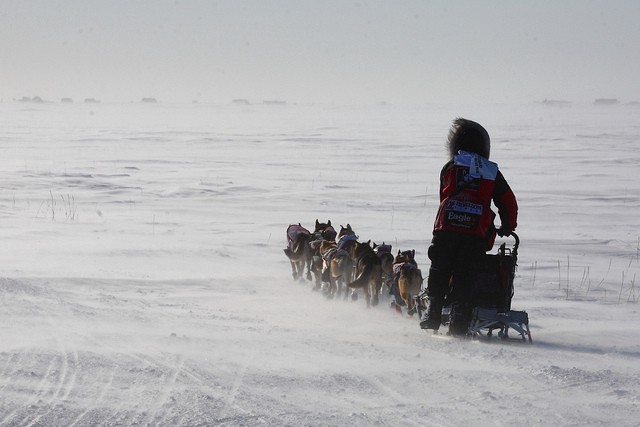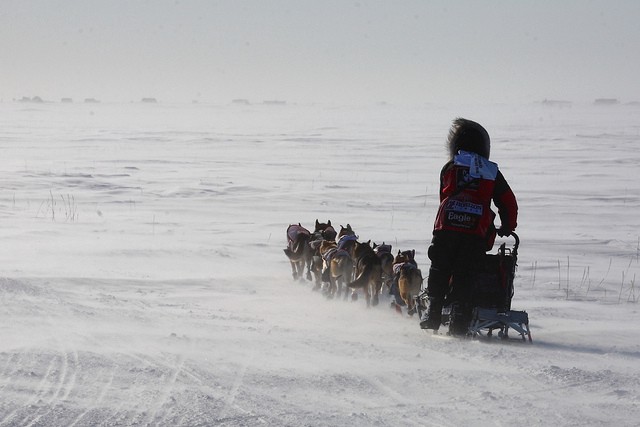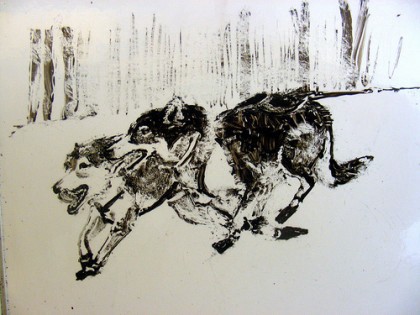When Will A Woman Win the Iditarod Again?


This was supposed to be a very different post. When I went to bed last night, it was almost a sure thing that for the first time in over twenty years, a woman would win the Iditarod. But when I woke up…alas. My dreams of a matriarchal utopia of ice and puppies had been dashed.
The Iditarod, as you may know, is an annual sled-dog race through more than 1000 miles of Alaskan wilderness, from Anchorage to Nome. The event it commemorates — several mushers relaying medicine to Nome in time to quell a diphtheria epidemic — took place in 1925, but the race itself didn’t come into being until 1973. Which means that it was still a pretty new institution when, for a few glorious years in the ’80s, a woman won every time.
First was Libby Riddles in 1985. She had finished the race twice before, but nowhere remotely close to first place, so her landmark win was a huge surprise. If you’d been betting on a female racer in 1985, it would’ve been Susan Butcher — until a moose attacked her team, killing two dogs and injuring the rest. She went on to win four of the next five years, though, including the year her team fell through the ice on a frozen river but then climbed back out and beat everyone else to the finish line.
Sled-dog racing is not really a sport in which men have a physical advantage over women. The dogs have to be strong and fast, but the musher just has to be crazy enough to voluntarily endure frostbite and sleep deprivation and hallucinations and pooping in backwoods snow. Clearly, there are women badass enough to get the thing done, women with names like Butcher who fall through the ice in some godforsaken expanse of uninhabitable tundra and then brush themselves off and win.
In recent years, that woman has been Aliy Zirkle. In 2000, she became the first woman to win the Yukon Quest (a lesser known but more challenging sled-dog race through Alaska and part of Canada), and she placed second in the Iditarod last year and the year before.

Yesterday, after trading places with four-time winner Jeff King for the past few days, Zirkle overtook him and rocketed into Safety, the last checkpoint before the finish line. King got blown off course by ridiculous Alaska winds and dropped out, meaning Zirkle was hours ahead of the closest contender. No one could touch her! The race was all hers!
So what happened? Not wanting to get blown off course herself, she decided to rest and wait a while. And then the guy in third place, Dallas Seavey, breezed past her and won by two minutes, believing all the while that “I had just beat my dad for third.”
Dallas Seavey has his own human-interest background story. Mushing is his family business. His father, Mitch Seavey, has been running the Iditarod almost every year since the ’80s and has won twice. Mitch’s second victory, last year, made him the oldest winner on record. Dallas won the year before that, making him the youngest.
Along with Dallas’s mom and brothers, the two run a sled-dog tour company in Seward, Alaska, where you can see their kennel facilities and ride behind their dogs. I’ve been there because I’m a huge dork, and it was great, and the Seaveys are great, and it’s cool to see a young person win.
But me and my imaginary friend Susan Butcher’s ghost were rooting for Aliy!
Zirkle’s take, according to USA Today: “Sure, yeah, hindsight, blah, blah, blah … second’s pretty good.” But second place three years in a row? Second place by two minutes? Girl, forget that you’re a superhuman snow-beast dog-empress for a second and come cry it out with me. And then next year, you got this. Next year.